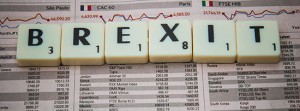Brexit and Binary: when it is or when it isn’t – or neither?
The UK’s EU referendum is, on the face of it, a binary event: either yes or no. Either of the 50:50 alternatives will bring with it boosts or plunges in certain asset prices, although these are still seen by some as partially discounted. Financial markets are prepared and able to absorb both the good and bad news, look through it and seek an opportunity to take advantage to over-reactions. A downturn in volatility is the point where some would make a decision to take advantage of an over-bought or over-sold market. Spikes and crashes happen with central banks coming to the rescue each time and plastering over the wounds. Subsequent developments, reaction and responsibility are for other people at another time.
Brexit may be binary, the answer is not
In the case of a Brexit/exit vote, there will be those out there who will say ‘Okay, sterling has discounted the worries of Brexit, the equity market will probably decline something in the region of a double figure percentage loss and other UK based assets may have a similar lurch downwards: but at some stage levels will become attractive enough to buy again’. That would seem to be the normal response; dust oneself off and get up again to live another day. It’s a bit like yin and yang, where negative news has a positive quality, the world will revert to harmony over time, from the financial markets’ perspective essentially ‘buy into weakness’ as the market finds a base post Brexit.
Brexit, there will be a time to buy, won’t there?
The trouble with this particular binary event is rather than being the sum of British inconsistency in its relationship with the EU Brexit would more likely be the precursor of events beyond the control of the Brexiteers. They have wished on the monkey’s paw, not realising what you wish for and what you get may be totally different.
Brexiteers already demanding heads, the PM’s first…
The first and most likely post Brexit event would be the departure of David Cameron as Prime Minister. He has said that he would remain as PM but that is highly unlikely as the Brexit camp would demand his head, in fact are already doing so. Despite more serious candidates his successor is seen as being the former mayor of London, Boris Johnson. Johnson is not necessarily odds-on favourite among Conservatives in Westminster, several cabinet members have already shown their hands. However, Johnson is overwhelmingly popular among the constituency offices of the Conservative Party, a group of people who feel shelved by David Cameron’s soft touch, dismissing recent electoral success. This may be seen as a positive, the removal of uncertainty but it could well snowball into other, unexpected, developments.
…if there is one thing that isn’t European in the UK it’s politics…
Nobody likes political uncertainty but Europeans may see the revolving door of executive ministers as normal. PM changes throughout Europe are seen more as a cleansing rather than a wholesale rejection of a dogma. So, from a continental perspective, Cameron’s departure would hardly be seen as abnormal politics. However, the exit of a PM in the two party environment of Westminster is certainly more worrying than executive departures, where coalition is the norm, or where presidential decree is the deciding factor. In the Brexit scenario the facts, that Cameron’s ‘remain’ campaign had lost, would justify the call for change from the majority of grass-roots conservatives. The Tory media, which has supported Brexit, would have field day, with Cameron and his cabinet allies as prey. The bloodletting would be like a political civil war and could even result in the change of the make-up of the UK’s political topography. Who knows, the disaffected center politicians from both the Labour and Conservative parties could up and give the Liberal Democrats critical mass. It’s happened before when the right-left spectrum has widened too far.
…so it’s out of the frying pan into the fire…
The replacement of Cameron with a tub-thumper like Johnson, would certainly change the political colour of the UK. Cameron’s compromises with the EU have been too much for the Brexiteers. Other European leaders have hardly helped Cameron’s cause and wrong-footed the PM in his time of need. Some will say, no surprise, that’s what Europe’s about and that’s why we must leave. Meanwhile, despite his boisterousness, Boris Johnson is an admirable politician from a family of self-confident, self publicists who project themselves like political Kardashians. Having written a book about Sir Winston Churchill, it is clear that the great man is also Johnson’s spiritual mentor as well: a great war time leader, a visionary but also a maverick like Johnson himself. These qualities are great in times of conflict but less so in times of the need for dialogue and cooperation. In a Brexit scenario the UK would be negotiating the cost of exit. A country that had effectively declared UDI on the one hand but still needs to align itself with political allies on the other.
…maybe wait until we see how extreme the ‘mother of parliaments’ has become…
So, an exit from EU and the emergence of populist politics in the UK would put the UK on a very different political path than it has ever been on. Greater political volatility and a move to a more robust and boisterous political landscape. Indeed, the UK Labour Party is already on its way down that path, taken further to the left by its leader, who despite cat-calling from his own colleagues is clearly intent on facilitating a new social contract in Britain. Imagine that, very much right of center/left of center leaders on each side of a two party system. That may be okay there were more effective ‘coalition’ parties to police them but that’s not likely in the current parliament, unless one views the SNP as willing to hold the center ground in Westminster.
…or when it looks as if the Scottish Nationalists will get their way after all…
That seems most unlikely. An exit from the EU would be like a red rag to an SNP that condemns everything that supports the Union. It will say that Britain has lost its cohesion and adhesion. From its point of view a London parliament that has become more extreme is nothing they would like more. The Mother of Parliaments will have lost its contract with the electorate and the SNP will then strike.
Bye-bye Europe, bye-bye the UK
Despite the hefty vote to remain part of the United Kingdom in the Scottish independence referendum, it would seem that a Brexited UK would be less attractive to Scottish voters. They would see that London had become too stretched in terms of political spectrum and that the aftermath of Brexit would see emergency measures introduced and most likely spending cuts. These latter would be like poison to Scotland, which has benefited from the benevolence of the rest of the UK, to a certain degree, but more significantly from Brussels. The sense of winning the battle but losing the war would be too much for the SNP, leading to a fresh referendum on being part of the United Kingdom, a higher likelihood of independence on the impression that sovereign UK would be going to the wall.
That of course could initiate capital flight, not necessarily from Britons (we may suffer ‘necessary’ capital controls) but definitely from overseas owners of UK assets. Indeed, they will hardly be rats escaping a sinking ship, more like overseas crew members who sense, like Captain Queeg, that the skipper has gone bonkers.
Bye-bye peace?
So Scotland goes, Wales less likely to do so but if independence takes place north of the border then there will be resumed pressure from the other side of the Irish Sea. Despite a move to a preference for a political solution, Tony Blair’s only achievement, Sinn Fein is unlikely to be able to stop a swing towards greater verbosity among the republican community, who may feel more justified than ever to seek a united Ireland, no longer a religious conflict but one of identity – Irish and European rather than Irish and part of the ‘newly’ independent Britain.
Conclusion – whipped to a frenzy
As Great Britain flagellates itself into a frenzy of its own nationalism, one wonders where the ball would stop rolling; the English Channel? Europe very much hopes that the worst will be kept in isolation on the British Isles, and that may be the case, but unlike the dreamy days of glasnost and perestroika, Russia is hardly a benevolent partner and will look to foster similar moves for either exit from the EU or calls for independence from groups of Europeans who feel that their culture has been put on the shelf of ethnicity. Spain is one glaring example within the EU but there are even more in Central Europe and these will most definitely receive covert Kremlin funding.
Supporters of Brexit may see this opinion as hogwash. They will point to the role Britain has played in the world and that history can repeat itself. Indeed, that is true. Independence from what was perceived to be a patronizing British Empire was the goal of India, which eventually saw partition and the creation of two new countries despite the wishes of the independence movement. Sometimes things happen that are unexpected despite the perceived integrity of a vision. Brexiteers would surely not wish for the above scenario but even a novice political commentator such as myself can see that the risks are too large to ignore.
Have I naively become a victim of ‘project fear’?
Please note that the opinions contained in this piece are personal and do not necessarily reflect the views of Lancea LLP.







